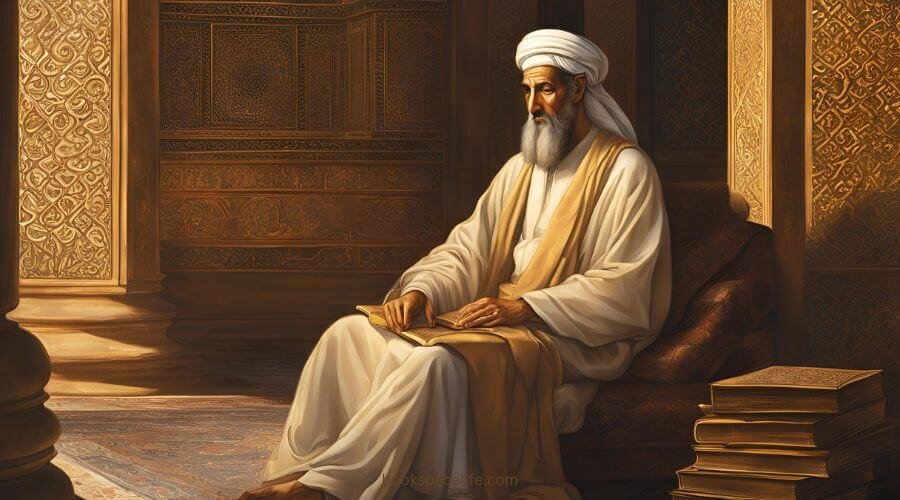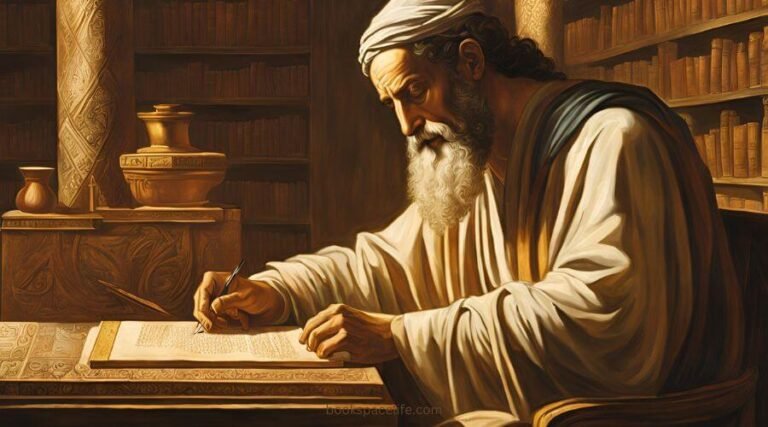Philo of Alexandria
Ibn Rushd : The Philosopher Who Bridged Cultures
Abu al-Walid Muhammad ibn Ahmad ibn Rushd, known in the West as Averroes (1126 – 1198 CE), was a towering figure in medieval philosophy, one of the most influential intellectuals of the Islamic Golden Age.
He was born in Córdoba, Spain, during the rule of the Almohad dynasty, a period when Islamic civilization was flourishing in Spain and North Africa.
Ibn Rushd was a polymath, making significant contributions not only to philosophy but also to medicine, astronomy, law, and theology.
His philosophical thought, which integrated Aristotelian logic with Islamic theology, created a bridge between Islamic and European thought that would echo through the Renaissance and Scholasticism.
In many ways, Ibn Rushd played a key role in preserving and transmitting ancient Greek philosophy to the West, ensuring its survival in both the Islamic world and the Christian West.
Table of Contents
(1) Early Life and Education
Ibn Rushd was born in Córdoba, in Al-Andalus, a region that had been part of the Muslim-controlled Iberian Peninsula since the 8th century.
He was born into a family of distinguished jurists, with his father and grandfather both serving in high positions in the local judicial system.
His family’s background in legal and theological affairs influenced Ibn Rushd’s early education, and he was trained in both Islamic jurisprudence (fiqh) and theology (kalam).
At the age of 16, Ibn Rushd began his formal education at the University of Córdoba, where he was exposed to a range of disciplines, including Greek philosophy, medicine, and mathematics.
His intellectual curiosity led him to study under prominent scholars, and it was during these formative years that he encountered the works of Aristotle, Plato, and Galien.
His early education was deeply rooted in the Islamic tradition, but it was through his exposure to Greek thought that he began to develop his own intellectual path.
Ibn Rushd was deeply influenced by Avicenna (Ibn Sina), the preeminent philosopher of his time, whose interpretations of Aristotle had dominated intellectual life in the Islamic world.
However, Ibn Rushd would later distance himself from Avicenna’s interpretations, offering his own original contributions that would distinguish him in the history of philosophy.
(2) Travels and Professional Life
After completing his education in Córdoba, Ibn Rushd traveled to Fez in Morocco, where he sought further knowledge in philosophy and medicine.
It was here that his career began to take shape. Ibn Rushd quickly rose to prominence in the intellectual circles of the Almohad Empire, which sought to reconcile Islamic orthodoxy with Greek philosophy.
His work on Aristotle gained the attention of the Almohad Caliph Abu Ya’qub Yusuf, who appointed him as a royal court physician and later as a judge.
These roles gave Ibn Rushd access to the highest echelons of power and influence in the Islamic world.
His position as court philosopher allowed him to interact with both philosophers and theologians and provided him with the intellectual space to explore his ideas about the integration of reason and faith.
Despite his professional success, Ibn Rushd’s philosophy was not without controversy, particularly his stance on the relationship between reason and revelation.
His attempts to reconcile Aristotelian philosophy with Islamic doctrine would later cause tensions with conservative factions of the Muslim clergy, and some of his works were even banned in parts of the Muslim world.
(3) Philosophical Contributions
Ibn Rushd’s contributions to philosophy are vast and varied. His most enduring legacy lies in his rigorous interpretation of Aristotelian philosophy.
Ibn Rushd was not merely an expositor of Aristotle, but rather a critical and innovative thinker who engaged deeply with the Greek philosopher’s ideas, often offering his own interpretations and critiques.
(i) The Incoherence of the Incoherence
One of Ibn Rushd’s most significant works is “The Incoherence of the Incoherence” (Tahafut al-Tahafut), written in response to the critique of philosophy by his contemporary Al-Ghazali.
In his work The Incoherence of the Incoherence, Al-Ghazali had attacked the philosophers of his time, especially those following Avicenna, for their attempts to reconcile Aristotelian philosophy with Islamic thought.
Al-Ghazali argued that philosophy, particularly Aristotelian logic, was fundamentally incompatible with Islamic theology.
In his Incoherence of the Incoherence, Ibn Rushd defends the role of philosophy and reason in understanding the world.
He argues that reason and revelation (i.e., the teachings of Islamic theology) can coexist harmoniously, provided they are understood properly.
For Ibn Rushd, philosophy is the tool by which one can come to understand the natural world, while revelation provides the moral and theological framework that governs human life.
Ibn Rushd believed that the natural world, including the laws of nature, could be understood through philosophical reasoning and scientific investigation.
He rejected the dichotomy set up by Al-Ghazali between reason and faith, asserting that Aristotelian reason and Islamic theology were not mutually exclusive, but instead, philosophical reasoning could serve as a pathway to better understand the truths revealed by Islam.
(ii) Commentaries on Aristotle
In addition to his original philosophical works, Ibn Rushd is also renowned for his commentaries on the works of Aristotle.
These commentaries are considered some of the most comprehensive and authoritative interpretations of Aristotle’s works.
Ibn Rushd’s commentaries helped preserve Aristotle’s philosophy and ensured its transmission to the Christian West.
His exegesis on Aristotle’s works influenced both Islamic philosophy and medieval European thought.
His commentaries were later translated into Latin, where they became a major source of Aristotelian knowledge for thinkers like Thomas Aquinas and Albertus Magnus.
Ibn Rushd’s commentary on Aristotle’s Nicomachean Ethics and Metaphysics is particularly notable, as it laid the groundwork for much of medieval Scholasticism in Europe.
His clear and methodical approach to Aristotle’s philosophy provided a bridge between Greek philosophy and Islamic thought, and later Christian thinkers built on his interpretations to advance their own ideas.
(4) Influence and Impact
Ibn Rushd’s philosophical contributions had a lasting influence on both the Islamic world and the Christian West.
His defense of Aristotelian philosophy and his attempts to reconcile reason and faith left an indelible mark on subsequent thinkers in both traditions.
In the Islamic world, Ibn Rushd’s work was particularly influential in the development of philosophical and theological thought.
While his ideas were controversial during his lifetime and were sometimes met with resistance from conservative factions within Islam, they nonetheless shaped the discourse of later philosophers, particularly in the Andalusian and North African intellectual circles.
In the Christian West, Ibn Rushd’s influence was equally profound. His commentaries on Aristotle were translated into Latin and became foundational texts for medieval Scholastic philosophers such as Thomas Aquinas, Albertus Magnus, and Roger Bacon. Averroism, the school of thought based on Ibn Rushd’s philosophy, became one of the most important intellectual movements in medieval Europe, especially in universities such as Paris and Oxford.
Ibn Rushd’s ideas about reason, philosophy, and theology helped to inspire the intellectual movements that characterized the Renaissance and the Scientific Revolution.
His emphasis on empirical observation, the use of logic and reason to understand the world, and his view that reason could be a tool for interpreting divine revelation had a profound impact on the development of modern science and philosophy.
(5) Conclusion
Ibn Rushd (Averroes) was a pioneering figure whose intellectual contributions bridged cultures, preserved the classical heritage of Aristotle, and reshaped the relationship between reason and faith in both the Islamic and Western traditions.
His writings on philosophy, medicine, law, and theology contributed to the intellectual currents of the Islamic Golden Age and had a lasting impact on medieval European thought.
Through his efforts, Ibn Rushd not only contributed to the philosophical heritage of his own time but also helped lay the groundwork for the intellectual revolutions that followed.
His legacy as a philosopher and intercultural bridge-builder remains one of the most significant in the history of philosophy.








